|

The music of guitarist Coco Montoya has
often been labeled as blues-rock, but I believe
his sound leans more to the pure blues side of
that equation. That solid foundation in the
blues comes from his early apprenticeship with
legends, first with Albert Collins and later
with John Mayall, before launching his solo
career more than 25 years ago. Montoya's album
count is now into double figures after previous
releases on Alligator, Blind Pig and Ruf,and his
newest one, Coming In Hot, has Montoya
back on Alligator.
The
spirit of Albert Collins lives on in Montoya's
music, especially when he covers one of the
Master of the Telecaster's better known numbers,
"Lights Are On But Nobody's Home." It's a slow
blues, with Montoya honoring his erstwhile
mentor quite well. That same guitar style can
also be heard at times on Don Robey's "Ain't It
A Good Thing," done earlier by Bobby "Blue"
Bland, and bolstered with the addition of former
Little Feat vocalist Shaun Murphy.
Some
of Montoya's best guitar work can be heard on
the opening number, "Good Man Gone," a hot
up-tempo blues with some searing chords, and
later on the mid-tempo blues "Trouble." He
throws in more intricate guitar playing on a
blues shuffle, "Stop Runnin' Away From My Love,"
on which Montoya's vocals take on a more soulful
tone.
The
title cut is a hard-driving, up-tempo original
that is augmented by the addition of Jon Cleary
on piano. "What Am I?" begins with a jazzy
guitar intro before transforming into a slow,
anthemic soul ballad sound, with Mike Finnigan
adding solid organ accompaniment. Montoya also
shines on vocals on the slow blues, "Witness
Protection."
The
closing number on Coming In Hot, "Water
To Wine," is one of its strongest selections, a
slower blues shuffle with powerful vocals and
Montoya's usual incendiary guitar.
Coming In Hot continues Coco Montoya's
impressive discography since leading his own
band. It's one of the best albums of the year to
date.
--- Bill Mitchell
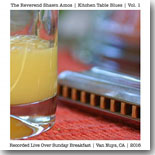 The Reverend Shawn Amos returns with a
wonderful five-song EP recorded live in his
California kitchen. This collection, Kitchen
Table Blues, Vol. 1 (Put Together Music),
consists of songs taken from Amos’ YouTube
series of the same title in which he cooked and
sang for 90 Sundays in his Van Nuys, California
home. Other performers, such as Mindi Abair,
Charles Wright, Jean McCain, and The Mudbug
Brass Band, would drop by as the show
progressed. The Reverend Shawn Amos returns with a
wonderful five-song EP recorded live in his
California kitchen. This collection, Kitchen
Table Blues, Vol. 1 (Put Together Music),
consists of songs taken from Amos’ YouTube
series of the same title in which he cooked and
sang for 90 Sundays in his Van Nuys, California
home. Other performers, such as Mindi Abair,
Charles Wright, Jean McCain, and The Mudbug
Brass Band, would drop by as the show
progressed.
There’s no information about the contributing
musicians on Vol. 1, but Amos rips
through a remarkably balanced set of tunes,
beginning with a folky version of The Faces’
“Ooh La La” that retains the original version’s
irresistible charm. It’s clear that Amos really
digs this tune based on his spirited performance
and the delightful musical accompaniment. Next
is the Alabama Shakes tune “Hold On,” featuring
a stripped-down arrangement of acoustic guitar
and understated horns. “Whip It,” from the ’80s
new wave band Devo (yes, you read that
correctly), retains the quirky funk of the
original but adds grungy harmonica and baritone
sax to the mix.
“Have Love Will Travel” was originally recorded
by ’60s-era garage rockers The Sonics. Amos’
version is a slower take on the original but is
no less effective and remains a crowd-pleaser at
Amos’ live shows. The closer is Tom Waits’
“Jesus Gonna Be Here,” which gets a
finger-snapping, toe-tapping jazzy arrangement
with nifty double-bass accompaniment plus a
liquidy electric guitar solo near the midway
point.
Amos
released Vol. 2 of this most excellent
collection in May, so stay tuned right here for
a future review. This is a series that works as
well on audio as on video, so if you’re not
familiar with Kitchen Table Blues, grab a
listen to Vol. 1 at your earliest
convenience.
--- Graham Clarke
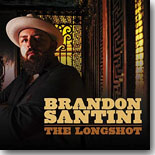 Singer/harmonica player Brandon Santini’s
debut release for American Showplace Music,
The Longshot, is a muscular set of
rock-edged blues leaning to the blues side of
the aisle. Santini had a hand in composing 10 of
the 11 tracks, co-producing the album with Ben
Elliot and John Ginty. The music covers a
variety of styles rooted in the blues --- roots,
country, gospel, rock, and soul --- and give
listeners a fuller appreciation of Santini’s
musical gifts. Singer/harmonica player Brandon Santini’s
debut release for American Showplace Music,
The Longshot, is a muscular set of
rock-edged blues leaning to the blues side of
the aisle. Santini had a hand in composing 10 of
the 11 tracks, co-producing the album with Ben
Elliot and John Ginty. The music covers a
variety of styles rooted in the blues --- roots,
country, gospel, rock, and soul --- and give
listeners a fuller appreciation of Santini’s
musical gifts.
The
opener, “Don’t Come Around Here,” kicks off the
disc in rocking roadhouse style, while the
mid-tempo “Beggin’ Baby” has a greasy soul feel,
with slide guitar accompaniment from Greg Gumpel
who co-wrote the song with Santini and Victor
Wainwright. The acoustic gospel track, “One More
Day,” finds Santini praying for help when things
get too tough, and “Drive You Off My Mind” keeps
that unplugged vibe going but adds electric and
slide guitar along with Ginty’s wonderous
keyboards. The rugged “Heartbreaker” is soulful
rocking blues, while “Broken Bones” is a gentle,
country-flavored ballad.
“Back To You” is a steady-driving rocker with
crunching guitar work from Timo Arthur and a
fabulous harmonica break from Santini. The pair
team up again for the catchy “My Worried Mind,”
with Arthur really outdoing himself on this
track. “Going Home” is another mostly acoustic
number, taken at a much quicker tempo. The
album’s lone cover, Willie Dixon’s “Evil (Is
Going On),” finds an inspired Santini emulating
Howlin’ Wolf’s growling vocal through a harp mic,
and the closing track, “Somebody’s Gotta Go,” is
a an energetic modern blues.
The Longshot is a strong set of traditional
blues with just the right amount of contemporary
influences. Brandon Santini does this style as
well as anyone currently practicing, really
showing his range and versatility with this fine
album.
--- Graham Clarke
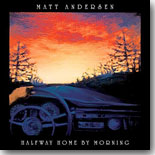 Canadian singer/songwriter/guitarist Matt
Andersen’s warm, soulful voice induces goose
bumps. Born in New Brunswick, Andersen got his
musical start with the band Flat Top,. He's won
European Blues Awards in 2013 and 2016 for Best
Solo/Acoustic Act, Maple Blues Awards for 2010
and 2011 for Entertainer of the Year and
Acoustic Act of the Year (also winning Male
Vocalist from 2011 – 2016), and in 2010 he won
the IBC Solo Performer Award, the first Canadian
to do so. Canadian singer/songwriter/guitarist Matt
Andersen’s warm, soulful voice induces goose
bumps. Born in New Brunswick, Andersen got his
musical start with the band Flat Top,. He's won
European Blues Awards in 2013 and 2016 for Best
Solo/Acoustic Act, Maple Blues Awards for 2010
and 2011 for Entertainer of the Year and
Acoustic Act of the Year (also winning Male
Vocalist from 2011 – 2016), and in 2010 he won
the IBC Solo Performer Award, the first Canadian
to do so.
Andersen’s latest release, Halfway Home By
Morning (True North Records), encompasses
blues, soul, R&B, folk, and Americana. Produced
by Steve Dawson and recorded in Nashville, the
new album features Andersen backed by a potent
group of musicians including Dawson (guitars,
pump organ, pedal steel, mandotar), guest
vocalist Amy Helm, Mike Farrington (bass), Jay
Bellerose (drums), Christ Gestrin (keyboards),
with Jim Hoke (saxophones), Charles Rose
(trombone), and Steve Hermann (trumpet), plus
Ann, Regina, and Alfreda McCrary on background
vocals.
All
13 tracks are originals, written or co-written
by Andersen, and they are deep and pure soul
music with roots in the blues, R&B, and
Americana. As good as Andersen’s vocals are, the
songs are equally gripping, addressing subjects
that most listeners can easily relate to
regarding affairs of the heart and everyday
life. The opener, “What Would Your Mama Say”
blends country, soul, and funk, and the
McCrary’s sweet backing vocals, Dawson’s slide
guitar and Gestrin’s keyboards help mightily,
too. The righteous rocker, “Free Man,” up the
funk a bit more and adds horns. Ms. Helm joins
Andersen for a beautiful country-flavored duet,
“Something To Lose.”
“The
Bed I Made” is a great slice of ’60s-era soul,
while the slow burning “Give Me Some Light” has
a country soul feel right out of Muscle Shoals.
“Better Than You Want” combines country, soul,
and a bit of rock, with irresistible
interplay between Dawson’s slide guitar, the
horns and the McCrarys. “Gasoline” follows the
same playbook but with more rock-edged guitar
added, and Andersen’s vocal on the wonderful
gospel-ish soul ballad “Over Me” is one of his
best on the album. Dawson’s soaring slide guitar
give the encouraging R&B track “Help Yours Elf”
a extra punch.
“Long Rider” is an exuberant country rock track
about returning home after too much time spent
away, while “Take Me Back” blends soulful vocals
from Andersen with Dawson’s slide guitar into an
interesting concoction. “Been My Last” is about
as straight country as the album gets, but
Andersen’s vocal straddles the thin line between
country and soul.
The
album closer, the acoustic “Quarter On The
Ground (A Song For Uncle Joe),” is a bit of a
tearjerker, with Andersen singing his regret
(backed by the McCrarys) that he didn’t get to
speak with his uncle one last time.
This
is one of the most impressive albums I’ve heard
this year. Matt Andersen is not just a powerful
vocalist that effortlessly handles a variety of
genres, but he’s also a great songwriter. With
the added attraction of Dawson’s guitar and
production, The McCrary Sisters’ always-perfect
vocal accompaniment and a first-rate band in
support, Halfway Home By Morning should
be required listening for any self-respecting
blues or soul fan.
--- Graham Clarke
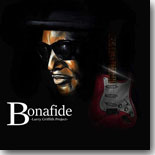 The
making of Atlanta-based blues man Larry
Griffith’s latest project, Bonafide, was an
arduous process. During recording, Griffith went
through a difficult breakup (is there any other
kind?) and was forced to take a two month break
to undergo throat surgery. Happily, the entire
ordeal has generated what might be Griffith’s
best and most inspired effort to date. In
addition to singing, playing guitar and drums
(he got his start as a 16-year-old session
drummer for Federal Records in his native
Cincinnati), Griffith produced and wrote all
nine tracks. The
making of Atlanta-based blues man Larry
Griffith’s latest project, Bonafide, was an
arduous process. During recording, Griffith went
through a difficult breakup (is there any other
kind?) and was forced to take a two month break
to undergo throat surgery. Happily, the entire
ordeal has generated what might be Griffith’s
best and most inspired effort to date. In
addition to singing, playing guitar and drums
(he got his start as a 16-year-old session
drummer for Federal Records in his native
Cincinnati), Griffith produced and wrote all
nine tracks.
Bonafide kicks off with the swampy funk of
“Hoodoo Hannah,” then rolls into the smooth
urban blues “Always Going To Be Something,” one
of several tracks on the album that deal with
relationship difficulties. Griffith offers a
fine piece of advice that everyone should follow
on the mid-tempo soul-blues, “It Ain’t What They
Call You,” and he’s just about fed up with his
significant other’s misadventures on the
faster-paced “I Know.”
The horn-fueled “I Do, I Did, I’m Done” finds
Griffith sacrificing to keep the one he loves,
and heats things up on the playful, sexy “Slow
Grind,” which leaves little to the imagination.
On the ballad “Had Enough,” Griffith bares his
soul about the broken relationship with his most
heartfelt vocal (with sweet support from 2Blu –
Teresa Lynn and Deborah Carr), but with the
upbeat R&B track that follows, “I’m Free,” he
starts to see daylight again. The closing track,
“Mama Tried,” is a loving tribute to Griffith’s
mother who went above and beyond in raising her
children under difficult circumstances.
Zig Ziglar once said, “Sometimes adversity
is what you need to face in order to become
successful.” The trials that Larry Griffith
recently faced obviously inspired him to greater
creative heights with some of his best and most
personal songs and performances yet. Bonafide
is, like the title, the real deal.
--- Graham Clarke
 The Denver-based
Taylor Scott Band’s musical
approach encompasses blues, funk, R&B, rock and
soul. Guitarist/vocalist Scott has toured the
U.S., Canada, and Europe with Otis Taylor,
appearing on Taylor’s Hey Joe Opus: Red Meat
with guitarist Warren Haynes, and enjoys an
ever-growing fan base with his own band. A
supremely soulful vocalist and powerful
guitarist and songwriter, Scott’s latest effort,
All We Have, touches on all the aforementioned
musical genres and should do much to expand
their audience beyond their home base. The Denver-based
Taylor Scott Band’s musical
approach encompasses blues, funk, R&B, rock and
soul. Guitarist/vocalist Scott has toured the
U.S., Canada, and Europe with Otis Taylor,
appearing on Taylor’s Hey Joe Opus: Red Meat
with guitarist Warren Haynes, and enjoys an
ever-growing fan base with his own band. A
supremely soulful vocalist and powerful
guitarist and songwriter, Scott’s latest effort,
All We Have, touches on all the aforementioned
musical genres and should do much to expand
their audience beyond their home base.
The album opener (following a 30-second intro)
is “Somebody Told Me,” a serious mix of funk,
rock, and pop that could, and should, be a hit
if there was any sense in the world. The
horn-fueled “Curiosity” follows, a cool track
that marries soul and country with a bit of an
inspirational message, and “Clearance Bin” is a
reflective ballad with a great little slide
guitar solo that might be the standout tune on
the disc.
The country-flavored “Salted
Watermelon” is a fun, mellow track that will
bring back fond memories to some listeners, and
the idiosyncratic rocker “Hair of Indigo” flirts
with psychedelia and features an appearance on
guitar from Los Lonely Boys’ Henry Garza.
“Carry Me Away” is a solid upbeat pop rocker,
and “Wishing Well” is a pop-ish blues rocker
with harmonica from Nic Clark and harmony vocals
from Sarah Morris Wirtz. “Surrounded” is an
acoustic reflection on the effects of society’s
obsession with all things social media, and
“Where This Is Going” is a slice of ’70s-era pop
rock. The album closes with a pair of ballads: “The Walk,” which deftly blends blues and
soul, and the wistful “Good Things.”
Scott and the band (Jon Wirtz – keyboards, Chris
Harris – bass, Lem Williams – drums) are
augmented by Clark, Garza, Josh Levy (baritone
sax), Ben Rubin (bass), Gilbert Elorreaga
(trumpet), Jesse Brooke (percussion), and Steve
Watkins (harmony vocals). All We Have is an
excellent mix of blues and rock, with a few
other genres added for good measure, that will
please any fan of good music.
--- Graham Clarke
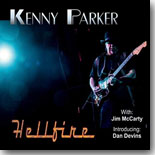 Like many music fans, guitarist
Kenny Parker’s
love of music began with the Beatles in the
early ’60s. While listening he began to
also check out the music of those artists who
were influences on the Fab Four and ended up
playing in his first band at age 14. He started
listening to B.B. King and Albert King in high
school and decided the blues were for him,
working in a Cadillac factory in his native
Detroit after graduation while working with
Detroit blues legends Mr. Bo, and later the
Butler Twins who backed Parker on his mid-'90s
debut recording for JSP Records, Raise The Dead. Like many music fans, guitarist
Kenny Parker’s
love of music began with the Beatles in the
early ’60s. While listening he began to
also check out the music of those artists who
were influences on the Fab Four and ended up
playing in his first band at age 14. He started
listening to B.B. King and Albert King in high
school and decided the blues were for him,
working in a Cadillac factory in his native
Detroit after graduation while working with
Detroit blues legends Mr. Bo, and later the
Butler Twins who backed Parker on his mid-'90s
debut recording for JSP Records, Raise The Dead.
Parker’s latest release,
Hellfire (Rock-A-While
Records), finds the guitarist/songwriter
collaborating with another Motor City guitar
monster, Jim McCarty, who goes back to Mitch
Ryder and the Detroit Wheels, the Siegal Schwall
Blues Band, the Buddy Miles Express, and Cactus
in the ’60s. They are joined by Dan Devins
(vocals/harp), Mike Marshall (bass), and Dave
Marcaccio (drums) with guest keyboardists
Leonard Moon, Bill Heid, and Chris Codish.
11 of the 12 tracks were written by
Parker.
The disc kicks off with a cool mid-tempo
shuffle, “I’ve Got My Eye On You,” before moving
to the soul burner “Baby Come Back To Me,” “Blind
And Paralyzed,” a classic bump-and-grind slow
blues, and “Bye Bye Baby,” an old-school rocker.
The title track is a swampy blues that tells the
story of a fiery-haired heartbreaker named Ruby,
while “Goin’ In Circles” is a solid blues number
that really kicks. “Dance With Me” is a
brisk jump blues.
Vocalist Devins turns in a heartfelt performance
on the soulful ballad “I’m Missing You, and the
catchy “But Then We Danced” has a ’60s Beach
Music feel. Following up is the driving blues
rocker “Half Crazy” and the fine seven-minute
“Back Up Plan,” a great slow blues that gives
Parker and McCarty ample room to show their
guitar chops.
The album closes with a live track
from St. Louis’ Gem Theatre, a dynamite cover of
Omar and The Howlers’ late ’80s anthem “Hard
Times In The Land Of Plenty.”
Parker doesn’t take the mic, but with guitar
work this awesome he really doesn’t have to.
His songwriting is also first rate and his
musical rapport with McCarty is also top-notch. Devins is a fine vocalist, tackling a variety
of blues styles with ease on this release. The
rhythm section and keyboards provide rock solid
backing throughout.
Hellfire is a powerful set
of blues rock that’s sure to please. Here’s
hoping Kenny Parker and his friends don’t go
another 23 years between albums.
--- Graham Clarke
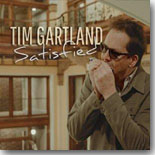 Tim Gartland recently issued his fourth solo
release, Satisfied (Taste Good Music). The
Nashville-based singer/songwriter/harmonica
player has been active on the blues scene in
Chicago, Boston, and Nashville for over 30
years, studying with Jerry Portnoy and playing
with a host of greats including Bo Diddley,
Carey Bell, Big Jack Johnson, and Pinetop
Perkins. His latest effort features ten original
tracks that blend the blues with soul, rock, and
roots, with backing from Tom West and Kevin McKendree (keys), Robert Frahm (guitars), Tom
Britt (slide guitar), Steve Mackey (bass), and
Wendy Moten and Ray Desilvis (backup vocals). Tim Gartland recently issued his fourth solo
release, Satisfied (Taste Good Music). The
Nashville-based singer/songwriter/harmonica
player has been active on the blues scene in
Chicago, Boston, and Nashville for over 30
years, studying with Jerry Portnoy and playing
with a host of greats including Bo Diddley,
Carey Bell, Big Jack Johnson, and Pinetop
Perkins. His latest effort features ten original
tracks that blend the blues with soul, rock, and
roots, with backing from Tom West and Kevin McKendree (keys), Robert Frahm (guitars), Tom
Britt (slide guitar), Steve Mackey (bass), and
Wendy Moten and Ray Desilvis (backup vocals).
The opener, “Drinking For Two,” is a rocking
tune lamenting the loss of a girl by drowning
his sorrows, and “Don’t Make More Trouble” is a
mid-tempo rumbler offering sound advice to all.
Gartland’s rumbling vocal plays to great effect
on the soulful “Blues For Free,” and he sounds
great on the old school rock n’ roller “Can’t
Paint A Prettier Picture.” “You Best Think
Twice” is an excellent blues shuffle with some
of Gartland’s finest harp work on the disc.
On the title track, which has a bit of a
laid-back country feel, Gartland reflects on the
things in life that bring him the most joy, and
encourages others to do the same --- more good
advice. “Walk On” keeps that peaceful, easy
feeling going with a nice ambling groove, while
“Why Does The Room Begin To Sway?” takes on a
funky reggae rhythm (with nice vocal backing
from Ms. Moten). The subdued “Artifacts,” a sad
tale of a lost love, features Britt’s slide
guitar, and the closer, “Don’t Judge Me,” is a
Windy City-styled shuffle that calls out
hypocrisy in others.
Satisfied is a fine set of relaxed, self-assured
southern-flavored blues and roots. Tim Gartland
is a superb harmonica player, a warm and
engaging vocalist, and a talented songwriter, so
there’s plenty of fine music for blues fans on
this enjoyable album.
--- Graham Clarke
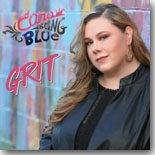 Cara Lippman, a.k.a.
Cara Being Blue, relocated
to Nashville from the New England area a decade
ago and quickly won over the music fans there
who nominated her for blues awards four years in
a row by the Nashville Industry Music Awards.
The Tennessee Rhythm and Blues Society honored
her in 2016 for her contributions to the blues
genre in the city. She currently serves as a pro
blues jam host and entertains at festivals all
over the Tennessee area. Cara Lippman, a.k.a.
Cara Being Blue, relocated
to Nashville from the New England area a decade
ago and quickly won over the music fans there
who nominated her for blues awards four years in
a row by the Nashville Industry Music Awards.
The Tennessee Rhythm and Blues Society honored
her in 2016 for her contributions to the blues
genre in the city. She currently serves as a pro
blues jam host and entertains at festivals all
over the Tennessee area.
Lippman’s first full length solo effort,
Grit,
was recently released and features ten original
songs written or co-written by the young singer,
who’s joined by a core band of Val Lupescu
(guitars), Eric Robert (keys), Jonathon Nixon
(bass), Flip Winfield (drums), Miqui Gutierrez
(sax), and Varney Greene (trombone), with guest
guitarists Dave Fields, Jack Pearson, and Will
Gustofson, bassist David Abdo, drummer Matt
Doctor, harmonica player Tim Gonzalez, and
backing vocalist Mandy Vixen on several tracks.
The title track opens the album, a sassy tribute
to those ladies who are determined to overcome
whatever obstacles they face. Guitarist Fields
appears on the ominous swamper “Crocodile Man,”
Gustofson adds fiery fretwork to the funky
“Leave Me In Flames,” “My Doggie,” and the
high-spirited “Some Fun,” which closes the disc,
while Pearson’s standout guitar is a highlight
on the slow blues “You Don’t Wanna.”
The rock-pop ballad “One Day” shows that Lippman is a solid fit in those genres, as well
as doing funky R&B on “Skippin’ Stone." “Old Feelin’”
is a bluesy ballad with a smoky vocal from
Lippman and excellent harpwork from Gonzalez,
and the horn-fueled “Kind Kinda Man” is a
swinging shuffle written in honor of her father,
Arthur Lippman.
Lippman is a talented vocalist with a tender,
but tough vocal style. She writes first-rate
songs and gets great support for the band who
shine in a variety of musical styles, as does
she. I guess you might say she has “grit" --- lots
of it. It’s a safe bet that we will be hearing
much more from Cara Being Blue in the years to
come.
--- Graham Clarke
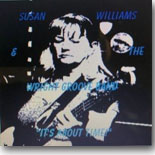 Susan Williams & The Wright Groove Band actually
released their debut album, It’s About Time, in
early 2018. The band (Williams – vocals/ bass,
Mike Gallemore – guitar/vocals, Darryl Wright –
lead bass, Rob Davis – drums, Mike Cruse – keys)
competed in the 2018 and 2019 International
Blues Challenge, and their album was entered into
the 2019 IBC in the Best Self-Produced CD
category. Williams is a 30+ year vet of the
Illinois blues scene and one-time bassist for
Shirley King. She has a rich, nuanced voice
equally comfortable in a blues or soul vein. Susan Williams & The Wright Groove Band actually
released their debut album, It’s About Time, in
early 2018. The band (Williams – vocals/ bass,
Mike Gallemore – guitar/vocals, Darryl Wright –
lead bass, Rob Davis – drums, Mike Cruse – keys)
competed in the 2018 and 2019 International
Blues Challenge, and their album was entered into
the 2019 IBC in the Best Self-Produced CD
category. Williams is a 30+ year vet of the
Illinois blues scene and one-time bassist for
Shirley King. She has a rich, nuanced voice
equally comfortable in a blues or soul vein.
The band’s debut offers
11 original tunes,
nine written by Williams and two by Gallemore.
The musical approach blends blues with R&B and
soul, with the songs describing relationships in a
variety of stages. The moody opener, “Tell
Me That You Love Me,” actually has a jazzy
after-hours feel, while “I Love What You Do” is a midtempo rocking blues with tasty slide from
Gallemore. “Loving You From A Distance” is a
sensitive blues ballad, followed by the upbeat shuffle
“Shame On You” and the funky “I’m Sorry.”
The
feisty “Meet Me In The Middle” is a
highlight, and “You’ve Got Another Think Coming”
is a rousing rocker with a touch of funk.
Williams’ desperate vocal and Gallemore’s
stinging lead guitar drives “One Way Street.”
“Please Come Back To Me” is a terrific blues
ballad with a lot of soul, and “Keep Moving On”
mixes blues with rock as Williams vows to walk
away from tough times without looking back. “Too Little, Too Late” is a sweet soul
blues that provides a fine conclusion to the
disc.
Williams has a smooth vocal style that’s
strikingly similar to Bonnie Raitt or Susan
Tedeschi but with a bit more soul and grit. The
band is a well-oiled machine with this material.
If you missed It’s About Time when it was
first released, this is your opportunity to make
the most of a second opportunity.
--- Graham Clarke
 Ally Venable’s third release,
Texas Honey, is
her first for Ruf Records. The 20-year-old
guitar phemom started the year off as part of
Ruf’s 2019 Blues Caravan tour and has toured in
support of Lance Lopez and Eric Gales. On this
excellent new effort she’s once again joined by
bassist Bobby Wallace and drummer Elijah Owings,
along with keyboardist Lewis Stephens and
special guests guitarists Mike Zito (who also
served as producer) and Gales. Venable wrote
eight of the eleven tracks, co-writing one with
Zito. Ally Venable’s third release,
Texas Honey, is
her first for Ruf Records. The 20-year-old
guitar phemom started the year off as part of
Ruf’s 2019 Blues Caravan tour and has toured in
support of Lance Lopez and Eric Gales. On this
excellent new effort she’s once again joined by
bassist Bobby Wallace and drummer Elijah Owings,
along with keyboardist Lewis Stephens and
special guests guitarists Mike Zito (who also
served as producer) and Gales. Venable wrote
eight of the eleven tracks, co-writing one with
Zito.
Texas Honey opens with a terrific rocker,
“Nowhere To Hide,” moves to the intense
mid-tempo “Broken,” about a relationship turned
bad, and soars into hyperspace with the gritty
title track. “Blind To Bad Love” is a smoldering
slow burner with a strong vocal from Venable and Zito providing rhythm guitar, while Gales
contributes guitar and co-lead vocals on the
driving blues rocker “Come And Take It,”
followed by a fun cover of Stevie Ray Vaughan’s
“Love Struck Baby” which marks the midway point
of the disc.
Zito’s slide guitar complements Venable’s moody
ballad “One Sided Misunderstanding,” leading
into the surging “White Flag” featuring some of
Venable’s rawest guitar work and vocals on the
album. “Long Way Home” is a standout track with
a catchy guitar riff and soaring guitar solo.
“Running After You” incorporates a bit of pop
into the blues rock mix quite effectively, and
the album closes with a distinctive,
hard-driving take on “Careless Love” that really
puts a fresh coat of paint on the 1920s
classic.
I’ve heard all three of Ally Venable’s releases
to date, and she has made remarkable progress
with each release. Texas Honey shows her to be
as formidable a songwriter as a guitarist and
vocalist. The sky’s the limit for this talented
young lady.
--- Graham Clarke
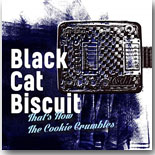 The Belgian band
Black Cat Biscuit was
established in 2015. The five-man band (Bart
“Yasser” Arnauts – vocals/rhythm guitar, Mark
“Mr. Mighty” Sepanski – harmonica, Stanley Patty
– lead guitar, Patrick “P Daddy” Indestege –
bass, Jeff “Junior” Gijbels – drums) won the
2018 Belgian Blues Challenge and competed in
this year’s European Blues Challenge, finishing
fourth. A few weeks later the group released
their debut album, That’s How The Cookie
Crumbles (Naked). The Belgian band
Black Cat Biscuit was
established in 2015. The five-man band (Bart
“Yasser” Arnauts – vocals/rhythm guitar, Mark
“Mr. Mighty” Sepanski – harmonica, Stanley Patty
– lead guitar, Patrick “P Daddy” Indestege –
bass, Jeff “Junior” Gijbels – drums) won the
2018 Belgian Blues Challenge and competed in
this year’s European Blues Challenge, finishing
fourth. A few weeks later the group released
their debut album, That’s How The Cookie
Crumbles (Naked).
The band’s sound incorporates smooth West Coast
swing, jazz, boogie, a little rock, and a little
bit of country, with rugged Texas-styled blues.
This is a most interesting combination of styles,
working very well as the band is talented and
more than up to the challenge. Amauts’ warm,
direct vocal style is reminiscent of Lou Reed, a perfect match for the
12 original
songs.
The opener, “Train 66,” is a rough and ready
rocker with ripping slide guitar from Patty
throughout. “Haunting Me,” a catchy, fast-paced
shuffle follows, followed by the intriguing “Son of a
Vampire,” an amusing horror tale set to a Bo Diddley beat, and the moody “Parrot Woman”
which has a swampy feel thanks to the eerie
guitar and Sepanski’s harmonica. “Ain’t Got
Nobody To Come Home” is a smooth and soulful
ballad with a mellow jazz vibe, and the up-tempo
“What I Really Need Is You” is a swinging
toe-tapper.
The rocking “He’s A Fool” has a droning,
hypnotic rhythm with more tasty slide guitar
from Patty, and the rollicking “Bad James” leans
toward C&W a bit with twangy guitar and
Sepanski’s harmonica. The upbeat “Hey
Little Kiddy” is a groovy shuffle, and the funky
“I Don’t Know” will put a hop in your step. “So
Sad And Lonely” is a moody after-hours blues
highlighted by Amauts’ rumbling vocal and
Patty’s liquidy guitar fills. The album
closer, “Goin’ Home,” is a countrified high
stepper.
There’s lots to like about
Black Cat Biscuit --- Amauts’
warm vocals, Patty’s guitar versatility,
Sepanski’s dynamic harmonica, and the rhythm
section’s peerless support. That’s How The
Cookie Crumbles provides more proof, as if you
needed it, that the blues is alive and thriving
on the other side of the world.
--- Graham Clarke
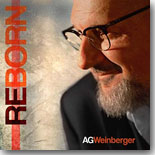 Transylvanian guitarist
AG Weinberger is not
only an imposing figure physically (6’5”, 255 lbs), he’s also an imposing figure on the
Romanian blues and jazz scene having won
multiple awards, including the President Medal,
which is the highest honor in Romania for Arts,
Music, and Cultural Recognition. He headlines
many of the major European festivals, playing 80
concerts a year, while doing his best to
popularize the blues in Eastern Europe via
performances, educational workshops, and hosting
radio and TV shows. Transylvanian guitarist
AG Weinberger is not
only an imposing figure physically (6’5”, 255 lbs), he’s also an imposing figure on the
Romanian blues and jazz scene having won
multiple awards, including the President Medal,
which is the highest honor in Romania for Arts,
Music, and Cultural Recognition. He headlines
many of the major European festivals, playing 80
concerts a year, while doing his best to
popularize the blues in Eastern Europe via
performances, educational workshops, and hosting
radio and TV shows.
Weinberger’s latest album,
Reborn (Bigfoot
Records), is a diverse affair, mixing blues and
jazz with rock and folk. He’s backed by a
talented group of musicians (Cseke Gabor –
keyboards, Pusztai Csaba – drums, Hars Viktor –
bass, Voga Viktoria – backing vocals, and
Pusztai Kabelacs Rita – background vocals) on
12 tracks, ten originals. Blues guitar
legend Bob Margolin also makes a memorable
appearance on one track.
Willie Dixon’s
classic “Wang Dang Doodle,” one of the album’s
two covers, gets things off to a
rousing start. Speaking of rousing and
funky, “Sweet Little Number” dazzles with an
irresistible second-line beat and some Fess-like
action on the ivories from Gabor. The simmering
soul-blues of “On The Wrong Side” is not only a
showcase for Weinberger’s vocals but his lap
steel guitar skills as well. Margolin makes his
appearance on “The Fool’s Lucky Day,” with his
excellent-as-always slide guitar.
The funky “It Wouldn’t Be Enough” features more
of Weinberger’s immaculate lap steel, and the
whole band gets a chance to stretch out on the
instrumental “Slippery Slope,” a slick piece of
jazzy blues. “Just One Minute” is a sweet
acoustic ballad with a sincere vocal and more
splendid lap steel from Weinberger. Johnnie
Bassett’s “Cadillac Blues” is one of my all-time
favorite blues tunes, with Weinberger doing a fine
job with his cover, his guitar work a little bit
hotter than the original.
“Shoot” is a rocking boogie track that should
get toes to tapping and booties to shaking.
“Caroline” has a pop feel and probably would
have made some noise on the charts a few years
ago, while the title track is an intriguing,
exploratory piece that incorporates blues, jazz,
and rock. The album concludes with “I Am The
Water,” a introspective piano ballad.
Reborn is a rock-solid set of blues and
blues-based tunes from AG Weinberger, one of
Europe’s foremost blues artist.
--- Graham Clarke
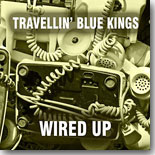 The Travellin’ Blue Kings (Stephen Hermsen –
vocals/guitar/harmonica, Jimmy Hontelé – guitar,
Winne Penninckx – bass, and Marc Gijbels –
drums) are based in Belgium, but have played
festivals all over Europe, including.Belgium, the
Netherlands, Norway, Sweden, Poland, Germany,
France, Switzerland, the U.K. and Italy. Their
brand of blues combines Texas, West Coast,
Memphis, and Chicago, with a bit of rockabilly
and swing added to the mix, and they captured
the first-ever European Blues Challenge in 2011. The Travellin’ Blue Kings (Stephen Hermsen –
vocals/guitar/harmonica, Jimmy Hontelé – guitar,
Winne Penninckx – bass, and Marc Gijbels –
drums) are based in Belgium, but have played
festivals all over Europe, including.Belgium, the
Netherlands, Norway, Sweden, Poland, Germany,
France, Switzerland, the U.K. and Italy. Their
brand of blues combines Texas, West Coast,
Memphis, and Chicago, with a bit of rockabilly
and swing added to the mix, and they captured
the first-ever European Blues Challenge in 2011.
Wired Up
(Naked) is the band’s debut release and
it features 11 original songs, all penned by
the band. The opener, “I Don’t’ Wanna Stop,” is
a lively jumping blues with a sizzling guitar
solo halfway through, “About This
World” is a hypnotic mid-tempo tune with a
droning guitar line and energetic harp, and “The
Way It Used To Be” has a modern blues sound with
an interesting backbeat and an otherworldly
guitar line trailing. “I Cannot Believe”
is a splendid slower-paced blues with nice West
Coast, T-Bone-esque guitar, and “Straight Eight”
has a countrified air with twangy guitar.
“I’m A Good Man” is a smooth slow blues
featuring B3 support from guest keyboardist
Patrick Cuyvers, and a wonderful extended guitar
solo from Hontolé. The title track is next, an
excellent instrumental with a distinctive
old-school surf guitar vibe that works very
well, and the intense “Ninety Minutes” follows
suit while also mixing in the blues. The guitar
riff that drives “Get It Done” brings to mind
classic ’60s pop/rock, and “Your Being” follows
a droning North Mississippi Hill Country rhythm
very effectively. The closer, “Into The
Night,” is a jumping rockabilly rave-up that
sounds like the Fabulous Thunderbirds of the
’80s.
The Travellin’ Blue Kings waited a bit to
release their debut recording,. Judging by
the interesting original tunes and enthusiastic
performances on Wired Up, the wait was well
worth it. Hopefully, these guys won’t keep us
waiting too long for a follow-up.
--- Graham Clarke
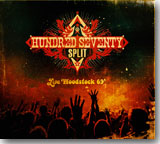 Ten
Years After bassist Leo Lyons left the band to
form his own power trio, Hundred Seventy Split, in
2010. TYA had become a global phenomenon
following a breathtaking performance at the
legendary 1969 Woodstock Festival. Recorded live
on tour at venues across Europe in 2019, Live,
‘Woodstock 69’ (Corner House Records) is a
golden anniversary celebration album which is
essentially a tribute both to TYA and Leo’s
co-founder, the late, great, guitar virtuoso,
singer and songwriter Alvin Lee. Ten
Years After bassist Leo Lyons left the band to
form his own power trio, Hundred Seventy Split, in
2010. TYA had become a global phenomenon
following a breathtaking performance at the
legendary 1969 Woodstock Festival. Recorded live
on tour at venues across Europe in 2019, Live,
‘Woodstock 69’ (Corner House Records) is a
golden anniversary celebration album which is
essentially a tribute both to TYA and Leo’s
co-founder, the late, great, guitar virtuoso,
singer and songwriter Alvin Lee.
All five songs from the Woodstock set are
included, and their authenticity and impassioned
delivery will appeal to hard-core blues
enthusiasts. Willie Dixon’s “Spoonful” confirms
from the outset the suitability of Joe Gooch to
carry the heavy mantle of Alvin Lee. Joe
replaced Lee in TYA at the start of the
millennium and stayed for over a decade before
teaming up with Leo again. Gooch’s greatest
quality has been to bring his own skills and
interpretations both vocally and instrumentally
to Alvin’s songs whilst retaining their
integrity.
Williamson’s “Good Morning Little School Girl”
features Lyons at his best, defying age with his
high energy, dexterous bass solo and fast and
furious dueling with Gooch. This track alone
epitomises what TYA was about with Lee and Lyons
at its epicentre, and which only Hundred Seventy
Split can emulate. “Help Me”’ by Sonny Boy
Williamson/Dixon is one of the bluest blues on
record, Gooch’s climactic, wailing guitar
underpinned by the brilliant dynamics of drummer
Damon Sawyer. “I Can't Keep From Crying”
initially stays faithful to Al Cooper’s version
before developing into a jazz-infused,
experimental yet controlled, tour de force with
its complex fretwork and changing rhythms prior
to returning to the main theme. The sheer genius
and inventiveness of Damon’s drumming set it
apart from any other version.
“I'm Going Home” is where it all started for TYA,
and, like Alvin, Joe’s credibility as a rocker
is impeccable as he storms through this
compilation of rock and roll classics at an
unprecedented velocity, held together
brilliantly by Leo and Damon. The three extra
TYA classics are “Love Like A Man,” with its
mesmeric guitar riff and piercing solos, the
psychedelic, percussive and haunting “Fifty
Thousand Miles Beneath My Brain,” and their
biggest hit, the poignant “I’d Love To Change
The World”, all written by Lee.
The two bonus tracks showcase the distinctive,
creative and exceptional talents within Hundred
Seventy Split which will hopefully encourage
readers to explore the band’s back catalogue and
discover a cornucopia of inspirational music.
"The Smoke" is a catchy, heavy rocking number
which reminisces about moving to London from the
Midlands, whilst "Do You Wish You Were At
Woodstock" does what the title suggests but in a
unique style which completes the metamorphosis
from TYA to HSS.
--- Dave Scott
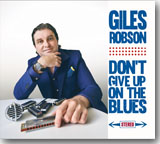 The big question was how could UK harp ace
Giles
Robson follow up his Blues Music Award in
Memphis for the Best Acoustic Album, Journeys To
The Heart Of The Blues? The answer lies in this
amazingly inventive, powerful and glorious
collaboration with Bruce Katz & The Band,
Don’t
Give Up On The Blues (American Showplace Music), which firmly establishes Robson as a premier
harp player on both sides of the pond. As the
30th anniversary of Harp Attack approaches, it
is timely that Chicago legends Cotton, Wells,
Bell and Branch have a worthy heir to the blues
harp throne. The big question was how could UK harp ace
Giles
Robson follow up his Blues Music Award in
Memphis for the Best Acoustic Album, Journeys To
The Heart Of The Blues? The answer lies in this
amazingly inventive, powerful and glorious
collaboration with Bruce Katz & The Band,
Don’t
Give Up On The Blues (American Showplace Music), which firmly establishes Robson as a premier
harp player on both sides of the pond. As the
30th anniversary of Harp Attack approaches, it
is timely that Chicago legends Cotton, Wells,
Bell and Branch have a worthy heir to the blues
harp throne.
This USA debut recording explodes into life with
“Land To Land,” its mesmeric harp riff and eerie
vocal delivery interspersed by piercing solos
complemented by trademark Hammond B3 background
licks from Katz. The jaunty “Don’t Give Up On
The Blues” promotes the healing qualities of the
blues, the optimistic message enhanced by
Bruce’s joyful and inspirational piano
accompaniment. The shuffling, percussive rhythm
of drummer Ray Hangen underpins “Damn Fool Way”
providing the perfect platform for Robson’s
quirky vocal and harp delivery.
“Your Dirty Look And Your Cheeky Grin” is a slow-burning, atmospheric account of truth, and lies
in a relationship, the lung-bursting wailing
harp and mournful piano keys building to a
crescendo. The mood lightens a little on the
beautifully arranged “Show A Little Mercy,”
Aaron Lieberman excelling on guitar and bassist Antar Goodwin maintaining a solid groove. All of
Giles’ technical qualities are evident in the
instrumental “Boogie At The Showplace” as he
duels with Katz, namely his supreme timing,
phrasing, use of vibrato and chugging.
On the politically charged “Fearless Leaders,”
Robson expresses his mistrust of who and what to
believe through his poignant vocals and
heart-rending harp accompaniment. The upbeat
“Hey, Hey Now!,” with its staccato rhythm
contrasting with the fluid B3 solo is another
highlight and a precursor to the equally
memorable instrumental, “Giles’ Theme.”
“Life,
With All It’s Charms” has one of the most
enchanting, repetitive harp phrasings as Giles
muses on what it means to hold his baby in his
arms. Chicago style blues is celebrated on “That Ol’ Heartbreak Sound,” with Robson proving his
status as a major player on the contemporary
scene, his energy boosted by the flamboyant Katz
and the phenomenal band.
The last of the 12
original tracks, “Way Past Midnight,” is an
instrumental tour de force from five musicians
at the top of their game with Giles Robson
proving he is well worth his place in blues harp
history.
--- Dave Scott
|